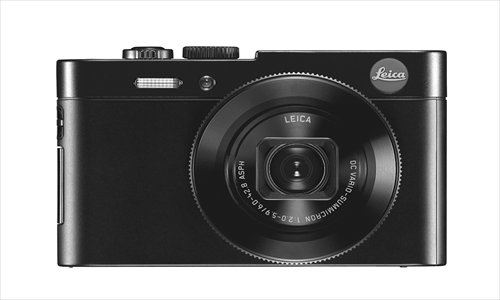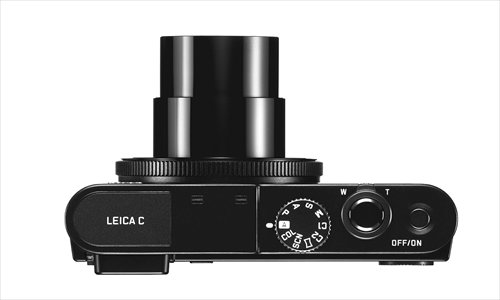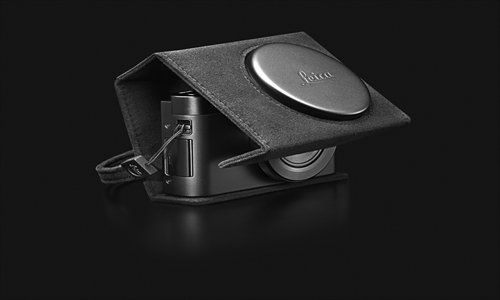HOME >> SCI-TECH
Leica brings Beijing into focus
By Li Qiaoyi Source:Global Times Published: 2013-9-13 5:03:02

The latest Leica C series cameras (from top to bottom). Photos: courtesy of Leica
When Steve Jobs launched the iPhone 4, he said that it looked like an old Leica camera, referring to the body of the smart device."Could we have gotten a bigger compliment?" Alfred Schopf, CEO of Leica Camera AG, said in an exclusive interview with the Global Times, after introducing the German camera maker's newest and biggest retail outlet to date on the Chinese mainland last weekend.
The Greater China region that includes the Chinese mainland, Hong Kong and Taiwan, represents a 30 percent share of Leica's entire sales, said Schopf, unfazed by the company's slowing growth in the region, which dipped slightly from the double digits in recent years. But Leica's China business is still strong, outperforming that of the European market, in terms of growth, he said.
The new outlet on Beijing's Financial Street in Xicheng district is the fifth on the Chinese mainland, after four partner stores were set up in Beijing, Shanghai and Shenzhen in the past three years. Leica has yet to open retail outlets in the market under its direct control.
But more wealthy cities likes Chengdu and Xi'an are also being eyed as locations for future outlets by Leica, Henry Chau, president of Hong Kong-based L&H Group and managing director of the newly launched store, told the Global Times.
Speaking on what lies ahead for the company, Schopf admitted that there is interest in store ownership on the Chinese mainland one day, but said that such a move needs to be done carefully and only when the time is right.
Leica was founded in Germany in 1849, and today's company did not end up with some 60 stores and 90 boutique shops across the world, mostly in Europe and Japan, without a little patience, after all.
"Step by step, we will further expand our network, [but] for the time being, we are restricted by our production capacity," he said.

The viability of cameras
Prudence, it appears, is part of the Leica package. The company is a firm believer in targeting smaller market segments unlike Apple, which plans to double the number of its China retail outlets over the next two years.
But even as the "best well-known brand in the world," according to Schopf, Apple is feeling the pinch in an increasingly competitive market. Apple saw revenues for the Greater China region fall in the third quarter ending June 29.
So perhaps the bigger question on Schopf's mind is how will his company fare against Apple products - that boast sophisticated built-in cameras - when mobile gadgets are all the rage these days?
Liu Xueyan, Shenzhen-based principal analyst for consumer electronics research at consultancy firm IHS iSuppli, told the Global Times on Monday that while camera makers like Leica will be able to maintain its relationship with photography gurus and hobbyists so long as they continue to release quality products, the reality is that the camera sector as a whole is struggling to hold onto mass consumers.
Japanese camera giants Canon and Nikon, the current market dominators in the high-end digital single-lens reflex segment, as well as the low-end digital camera market, have seen declining sales at both poles of the sector, proving signs of uncertainty.
Sharing the same viewpoint, Christopher Chute, research director at US-based market research firm International Data Corporation (IDC), was quoted in an article published by The Korea Times in August saying that the camera arena is likely "to go into a long-term decline."
The global digital camera market is forecast by IDC to sag 29 percent to 102 million units next year, while the compact camera segment is expected to shrink further to 80 million units this year from 132 million units in 2010.

Looking ahead
Leica's Schopf knows all too well how smart devices have been eating into the turf of compact cameras, what he likens to a "trend will not go away," but said that the company is, at least, for the time being, "not afraid."
He said that smartphones packing cameras function as illuminative devices to get more people interested in perfecting their pictures and mastering the art of photography - for which both activities require better equipment to properly pursue.
"So you see, smartphones are not our enemy - but a starting point for us," he said. "Once users decide that they want a better image quality, higher-end cameras become their first choice."
Still, that doesn't mean that the company doesn't have their pulse on the mobile gadget era. Its newest Leica C series showcased at its newly opened Beijing outlet features a compact camera with a sleek body and Wi-Fi connectivity, Leica's first-ever Wi-Fi-enabled gizmo - a move that could be seen as the company's foray into the social media-powered camera segment.
But IHS iSuppli's Liu said that many camera makers including Canon, Nikon, Sony and Samsung have already taken the wraps off various Wi-Fi-enabled cameras in the past two years.
Among them, Samsung, the world's biggest smartphone vendor, has gained particular popularity with its Galaxy Camera lineup, which runs on Google's Android mobile operating system.
This summer, the South Korean tech giant announced its Samsung Galaxy NX, showing it off as the world's first interchangeable lens mirrorless camera to be powered by Android.
Still, despite being a late-comer to the mobile gadget arena, Leica's unspecified plans to integrate social media functionality into its high-end cameras in the future are destined to make up for the delay, said Schopf.
The good news is that there is room for growth in this area, said IHS iSuppli's Liu, adding that it isn't all pessimistic for the outlook of the camera market.
"The battery lifespan limits the use of smart devices as cameras on long journeys, and this is necessitating greater demand for portable cameras," he said.
"Therefore, there is most certainly promise in this segment of the market," he said.
Posted in: Feature